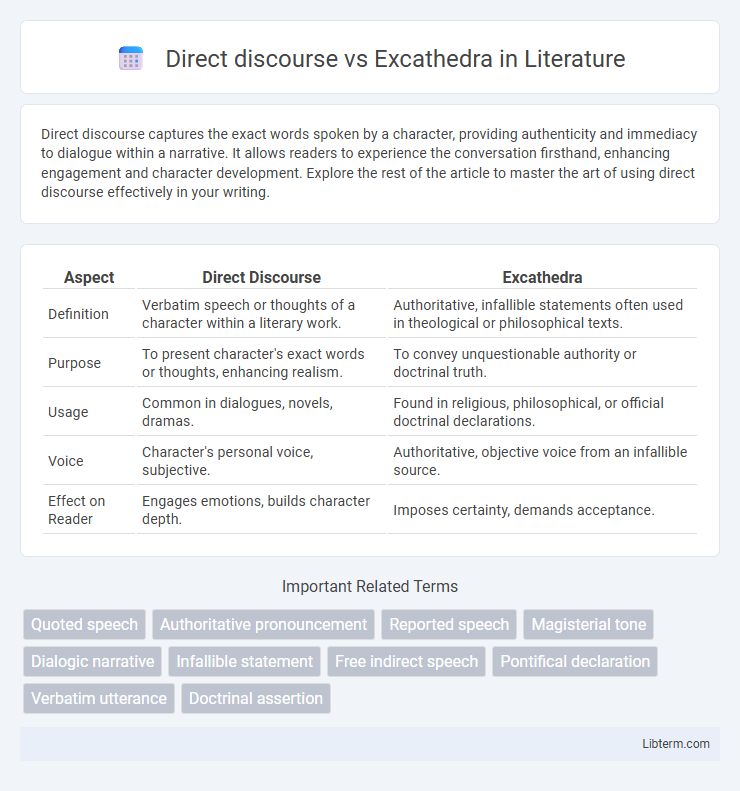Direct discourse captures the exact words spoken by a character, providing authenticity and immediacy to dialogue within a narrative. It allows readers to experience the conversation firsthand, enhancing engagement and character development. Explore the rest of the article to master the art of using direct discourse effectively in your writing.
Table of Comparison
| Aspect | Direct Discourse | Excathedra |
|---|---|---|
| Definition | Verbatim speech or thoughts of a character within a literary work. | Authoritative, infallible statements often used in theological or philosophical texts. |
| Purpose | To present character's exact words or thoughts, enhancing realism. | To convey unquestionable authority or doctrinal truth. |
| Usage | Common in dialogues, novels, dramas. | Found in religious, philosophical, or official doctrinal declarations. |
| Voice | Character's personal voice, subjective. | Authoritative, objective voice from an infallible source. |
| Effect on Reader | Engages emotions, builds character depth. | Imposes certainty, demands acceptance. |
Understanding Direct Discourse: Definition and Key Features
Direct discourse is a narrative technique that presents a character's spoken or internal thoughts verbatim, maintaining the original phrasing and intonation. Key features include the use of quotation marks, precise replication of the speaker's language, and often a focus on the immediacy of dialogue or inner monologue. This method enhances authenticity and vividness, allowing readers to experience the exact words and emotions of the speaker.
What Does Ex Cathedra Mean? Origins and Context
Ex cathedra, a Latin phrase meaning "from the chair," refers to authoritative declarations made by the Pope in his official capacity as the supreme teacher of the Catholic Church, carrying infallible weight on matters of faith and morals. This concept originated in the 19th century, particularly defined during the First Vatican Council in 1870, distinguishing such pronouncements from ordinary or direct discourse, which may not hold the same doctrinal authority. Understanding ex cathedra is essential for grasping the theological and historical context behind papal infallibility and the Church's teaching authority.
Historical Development of Direct Discourse
Direct discourse, characterized by the verbatim representation of a speaker's words, emerged prominently in classical literature as a technique to convey authenticity and immediacy in narratives. Its historical development can be traced back to ancient Greek and Roman texts, where playwrights like Sophocles and historians such as Herodotus utilized direct speech to enhance dramatic effect and credibility. Over centuries, direct discourse evolved through medieval chronicles and Renaissance dialogues, solidifying its role in both literary and rhetorical traditions.
The Evolution and Authority of Ex Cathedra Statements
Ex Cathedra statements represent authoritative pronouncements made by the Pope on matters of faith and morals, marking a pivotal evolution from traditional direct discourse to a formalized doctrinal assertion. Rooted in the doctrine of Papal Infallibility defined during the First Vatican Council of 1870, these declarations carry binding authority for the Catholic Church, distinguishing them from ordinary papal teachings. The evolution of Ex Cathedra statements reflects the Church's effort to preserve doctrinal purity while asserting clear hierarchical authority in theological discourse.
Comparing Direct Discourse and Ex Cathedra: Key Differences
Direct discourse captures a speaker's exact words in quotations, providing immediate and personal communication, while ex cathedra pronouncements represent authoritative, infallible declarations made officially by a person in an ecclesiastical or formal capacity. Direct discourse emphasizes verbatim speech and contextual nuance, contrasting with the definitive, binding nature of ex cathedra statements which carry doctrinal or legal weight. Understanding these distinctions clarifies their roles in communication: direct discourse conveys individual expression, whereas ex cathedra asserts institutional authority.
Use Cases: When to Apply Direct Discourse
Direct discourse is ideal for capturing authentic, vivid speech in literary works, enhancing character development and reader engagement by presenting dialogue verbatim. It is commonly applied in novels, plays, and interviews to convey tone, emotion, and personality directly from the speaker. Excathedra declarations, by contrast, serve authoritative or formal pronouncements typically used in religious or academic contexts, where unambiguous, absolute statements are required rather than conversational authenticity.
The Role of Ex Cathedra in Religious and Secular Settings
Ex Cathedra pronouncements carry authoritative weight in both religious and secular contexts, serving as official, infallible declarations primarily within the Catholic Church, particularly on doctrines of faith and morals. Direct discourse, in contrast, reflects personal or informal speech without the binding authority found in Ex Cathedra statements. The role of Ex Cathedra is crucial for maintaining doctrinal clarity and institutional authority, distinguishing definitive teachings from general dialogues or theological opinions.
Impact on Communication: Clarity vs. Authority
Direct discourse enhances communication clarity by presenting the speaker's exact words, enabling precise interpretation and emotional connection. Excathedra statements reinforce authority by delivering definitive, authoritative pronouncements that limit debate or ambiguity. Balancing direct discourse with excathedra declarations shapes how messages are perceived, either fostering openness or asserting finality in communication.
Common Misconceptions about Direct Discourse and Ex Cathedra
Direct discourse is often misunderstood as mere quotation, while it specifically involves the exact words spoken by a subject within a narrative or dialogue. Ex cathedra statements, issued infallibly by the Pope concerning doctrine, are frequently confused with general papal opinions or teachings, which do not carry the same authoritative weight. Common misconceptions blur the line between narrative voice and authoritative pronouncement, leading to inaccurate interpretations of both forms.
Choosing the Right Approach: Practical Guidelines
Selecting between direct discourse and ex cathedra communication hinges on audience engagement and message clarity; direct discourse fosters interactive dialogue by quoting exact speech, while ex cathedra denotes authoritative declarations without room for debate. Practical guidelines suggest using direct discourse to encourage critical thinking and nuanced understanding in educational or conversational contexts. Employ ex cathedra statements in legal, religious, or formal settings where unambiguous authority is essential for decision-making and policy enforcement.
Direct discourse Infographic

 libterm.com
libterm.com